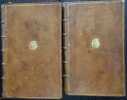43 books for « baron thiry »Edit
-
Century
18th (17)
20th (20)
-
Countries
Belgium (3)
Denmark (1)
France (35)
Germany (2)
Switzerland (2)
-
Syndicate
ILAB (25)
NVVA (1)
SLACES (1)
SLAM (23)
Topics
- Age (1)
- Anonymous (1)
- Anticlerical (7)
- Army (3)
- Astrology (1)
- Atheism (9)
- Countryside (4)
- Customs (1)
- Diderot et d'alembert (2)
- Early printed books (2)
- Economics (1)
- Encyclopaedia (5)
- England (1)
- Fables (1)
- First edition (1)
- First empire (1)
- Germany (2)
- Gold (1)
- Great britain (1)
- Helvetius (1)
- History (7)
- Holbach paul henri thiry, baron d' (18)
- Institutions (1)
- Liturgy (1)
- Mythology (1)
- Napoleon i (6)
- Paganism (1)
- Philosophy (15)
- Policy (2)
- Political economy (3)
- Russia (1)
- Sects (1)
- Stars (1)
- Switzerland (1)
- Tales (1)
- United kingdom (1)
- Voltaire (1)
- War (3)
Wagram
Editions Berger-Levrault Broché 1966 In-8 (13,5 x 22,1 cm), broché, 303 pages, bien complet des 6 cartes ; pliure au dos et au quatrième plat, un coin corné, par ailleurs intérieur frais, assez bon état général. Livraison a domicile (La Poste) ou en Mondial Relay sur simple demande.
Le roi de Rome (Janvier 1811- juin 1812)
Berger-Levrault. 1968. In-8. Broché. Etat d'usage, Couv. légèrement passée, Dos plié, Quelques rousseurs. 381 pages.. . . . Classification Dewey : 944.05-Premier Empire, 1804-1815
Classification Dewey : 944.05-Premier Empire, 1804-1815
Le bon-sens ou Idées naturelles opposées aux idées surnaturelles
Londres, 1773 [2bl.] + xi + [1bl.] + 298 + [2bl.] pp., 21cm., reliure cart. muette (quelques manques au dos), texte frais avec peu de rousseurs, cfr. Vercruysse 1773 A1, [La première édition a paru en 1772. L'ouvrage fut condamné au feu en 1774 et mis à l'Index en 1775], F101462
Bonaparte en Italie. 1796-1797
Berger-Levrault 1973 In-8 broché 22 cm sur 13,5. 731 pages. Bon état d’occasion.
Avec 5 cartes Bon état d’occasion
Le roi de Rome - Napoléon Bonaparte, Janvier 1811 - Juin 1812
Berger-Levrault. 1968. In-8. Broché. Etat d'usage, Couv. convenable, Dos plié, Non coupé. 381 pages. Quelques rousseurs sur les plats.. . . . Classification Dewey : 944.051-Histoire de Napoléon 1er
Classification Dewey : 944.051-Histoire de Napoléon 1er
LES ANNEES DE JEUNESSE DE NAPOLEON BONAPARTE 1769-1796.
BERGER LEVRAULT. 1975. In-8. Broché. Etat d'usage, Tâchée, Dos satisfaisant, Intérieur frais. 296 pages - plats tâchés.. . . . Classification Dewey : 944.051-Histoire de Napoléon 1er
Classification Dewey : 944.051-Histoire de Napoléon 1er
SAINTE-HELENE - COLLECTION NAPOLEON BONAPARTE.
BERGER LEVRAULT. 1976. In-8. Broché. Bon état, Couv. convenable, Dos satisfaisant, Intérieur frais. 295 pages .. . . . Classification Dewey : 944.051-Histoire de Napoléon 1er
COLLECTION NAPOLEON BONAPARTE. Classification Dewey : 944.051-Histoire de Napoléon 1er
La contagion sacrée ou Histoire naturelle de la superstition. Ouvrage traduit de l'anglais.
Londres [i. e. Amsterdam] : Marc-Michel Rey, 1768 Deux tomes en un volume in-12, (2)-X-169-(4)-184 pages. Veau moucheté de l'époque, dos à nerfs orné.
Dos et plats légèrement frottés. Mors fendu au premier plat. Première édition de ce brûlot contre la religion. "L'homme n'est superstitieux que parce qu'il est craintif ; il ne craint que parce qu'il est ignorant". Matérialiste athée, célèbre pour ses dîners philosophiques, Paul Henri Thiry (1723-1789), baron d'Holbach, s'opposa à toutes les doctrines religieuses, considérées comme des instruments du despotisme. La hardiesse de ses idées l'obligea à publier sous divers noms d'emprunt. "Cet ouvrage est réellement de la composition du baron d'Holbach. C'est pour se soustraire, lui et ses amis, à tout genre de désagrément qu'il a annoncé dans l'avertissement l'avoir traduit de l'anglais de Jean Tranchard et Th. Gordon." (Caillet)La Contagion sacrée fut condamnée par le Parlement le 18 juillet 1770 à "être lacérée et brûlée", et mise à l'index en 1821. Barbier I, 739 ; Cioranescu 34033 ; Caillet II, 5215 ; Tchemerzine III, 717 ; Vercruysse 1768-A2.
La contagion sacrée ou histoire naturelle de la superstition - 2 volumes - Édition originale
Édition originale de cet ouvrage faussement traduit de l'anglais par Paul Thiry, baron d'Holbach.L'ouvrage fut brulé en 1770 en même temps que son système de la nature.Londres - 1768. - 169 pp et 184 pp.Reliure pleine basane racinée de l'époque. Dos lisse orné avec pièces de titre et de tomaison rouges et vertes. Mouillures sur la première et la dernière page, et la page de titre du T2. Fentes aux mors. Coiffes usées. Pas de rousseur sur les autres pages. Bon état. Format in-12° (16x10).
LE BON SENS DU CURÉ J. MESLIER. Suivi de son TESTAMENT. Précédé d'une " Vie de J. Meslier d'après Voltaire ".
Au Palais des Thermes de Julien. 1802 [en réalité : 1820]. In-8°, reliure demi-chagrin, dos orné. 380 pages.
Reliure modeste mais saine ; bon état.
NERI, Antonio & MERRET, Christopher & KUNCKEL, Johann & M.D.*** [or Paul Henri THIRY, Baron d'HOLBACH]
Reference : 51457
Art de la Verrerie (1752) ; L'Art de la Verrerie ou l'on trouvera la maniere de faire le Verre et le Crystal, d'y porter des Couleurs, d'imiter les Pierres Pretieuses, de preparer et colorer les Emaux, de faire la Potasse, de Peindre sur le Verre, de preparer des Vernis, de composer des Couvertes pour les Fayances et Poteries, d?extraire la Couleur Pourpre de l'Or, de contrefaire les Rubis, de faire le Saffre, de faire et peindre les Porcelaines.
, Chez Durand et Pissot, Paris, France, 1752 Relie, demi-toile, en veau a l'impression dore et au 5 nerfs, plattes interieures decorees, (19e siecle) , 632 pp.,16 pl., 26 x 21 x 5 cm. V.G. condition.
L'Art de la Verrerie OU l'on trouvera la maniere de faire le Verre et le Crystal, d'y porter des Couleurs, d'imiter les Pierres Pretieuses, de preparer et colorer les Emaux, de faire la Potasse, de Peindre sur le Verre, de preparer des Vernis, de composer des Couvertes pour les Fayances et Poteries, d?extraire la Couleur Pourpre de l?Or, de contrefaire les Rubis, de faire le Saffre, de faire et peindre les Porcelaines, &c.. Translated from German into French. Traduits de l'Allemand par M.D.*** [ou Paul Henri THIRY, Baron d'HOLBACH].
HOBBES (Thomas), HOLBACH (Paul Thiry, baron d') traducteur et FAIGUET DE VILLENEUVE (Joachim)
Reference : 38500
(1772)
1- HOBBES, [HOLBACH, traduction, édition]. De la Nature Humaine, ou Exposition des facultés, des actions & des passions de l'Ame, & de leurs causes déduites d'après des principes philosophiques qui ne sont communément ni reçus ni connus. Par Thomas Hobbes; Ouvrage traduit de l'Anglois [par le baron d'Holbach]. Londres [i.e. Amsterdam, Marc-Michel Rey], 1772. (4), iv, 171 p. [Suivi de]2- [FAIGUET DE VILLENEUVE]. Légitimité de l'usure légale où l'on prouve son utilité; que les casuistes sont en contradiction avec eux-mêmes. Monts de piété. Pratique injuste de la poste. Où l'on discute les passages de l'Ancien & du Nouveau Testament sur l'usure &c. Amsterdam, Marc-Michel Rey, 1770. (4), 168 p.
1772 2 ouvrages reliés en un volume in-12 (153 x 96 mm), plein veau marbré de l'époque, dos lisse entièrement orné d'un décor doré à la grotesque, pièce de titre de maroquin bordeaux, tranches rouges.
1- Première édition de la traduction française réalisée par le baron dHolbach de cette oeuvre qui exerça une influence déterminante tant sur sa propre doctrine que sur la philosophie politique des Lumières. Ladresse londonienne est fictive; le livre a en réalité été imprimé à Amsterdam par Marc-Michel Rey. "Diderot nous a laissé un témoignage de lenthousiasme que suscita chez lui ce traité [in Lettre à Sophie Volland]. Bien des éléments de cette doctrine passeront dans le Système de la Nature, avant tout le sensualisme conséquent, le mécanisme et le relativisme des critères moraux et sociaux" (cf. Naville, 'Holbach', p. 218-224). (Conlon, 'Siècle des Lumières',72:860. Garcia, 'Hobbes: Bibliogr. internationale', p.8. Vercruysse, éd. 2017, 1772/D2. Tchemerzine-Scheler, III, 729).2- Édition originale et unique de cet essai, développement de larticle "Usure" que lauteur avait rédigé pour lEncyclopédie.Faiguet de Villeneuve présente une défense vigoureuse du prêt à intérêt, en réfutant les critiques traditionnelles émanant de lÉglise et du droit.Sur la base darguments dordre religieux, économiques et sociaux, il démontre que le prêt favorise le développement du commerce et de lindustrie, tout en permettant aux individus créatifs de développer leurs compétences et de créer une dynamique bénéfique entre détenteurs de capitaux et entrepreneurs.Au fil de sa démonstration, il propose une réforme novatrice du service postal, suggérant que le tarif d'expédition soit calculé en fonction de la forme et du poids des envois.Joachim Faiguet de Villeneuve (1703-1780), économiste et philanthrope, trésorier de France au Bureau des Finances de Châlons-sur-Marne, fut lun des collaborateurs réguliers de LEncyclopédie. Il est reconnu comme lun des pionniers de la science de léconomie politique en France.(Conlon, 'Siècle des Lumières', 70 :874. Goldsmiths-Kress, n°10683.3. Higgs, n°5043).Mors frottés. Très bon exemplaire, très frais, relié à lépoque.


Phone number : 33 01 47 07 40 60
Boulanger (Nicolas-Antoine) - (Holbach, Paul-Henri Thiry, baron d') :
Reference : 3142
(1766)
Antiquité (L') dévoilée par ses usages, ou examen critique des principales opinions, cérémonies et institutions religieuses et politiques des differens peuples de la Terre. Par feu M. Boulanger.
Amsterdam, Marc Michel Rey, 1766 ; in-4 ; plein veau fauche tacheté, dos à nerfs décoré, pièce de titre bordeaux, tranches rouges cirées (reliure de l'époque) ; VIII pp., 412 pp.
Edition originale rare (certains exemplaires auraient, selon Vercruysse-1766 / F1, 1 feuillet d'errata de 2 pages).Ouvrage posthume, revu sur le manuscrit original par le baron d'Holbach, avec le précis de la vie de l'auteur par Diderot, d'après Grimm.(Adams, AB2 ; Caillet, 1530 ; Tchemerzine-Scheler, II-946, 947 et III-715)Cultes anciens qui intègrent la mémoire du déluge ; Fable des géants et gigantomachie ; Sectes anciennes ; Paganisme ; Pèlerinages ; Culte des montagnes ; Oracles des Sybilles ; Culte des astres ; Astrologie ; Mystères d'Eleusis ; Astronomie ancienne, éclipses, comètes, etc. ; Sabianisme ; Division du temps, les nombres, les cycles, périodes apocalyptiques ; Fin des temps ; Esprit liturgique, fêtes solaires et fêtes lunaires, néoménies, sabbat ; Déluge.Intérieur en bon état général et reliure bien solide ; restaurations aux coiffes et bas du dos, coins légèrement usés, petits manques sur les plats et les coupes, quelques épidermures aux plats.


Phone number : 06 60 22 21 35
1- [HOLBACH]. Système de la Nature ou Des loix du monde Physique & du monde moral. Par M. Mirabaud [i.e. d'Holbach]. Nouvelle édition à laquelle on a joint plusieurs pièces des meilleurs Auteurs relatives aux mêmes objets. Londres [i.e. Neuchâtel, Société typographique], 1771. 2 volumes de (14), 397 p. et (4), 500 p., (3) p. de tables.2- [HELVETIUS ?]. Le vrai sens du Système de la Nature. Ouvrage posthume de Mr. Helvétius. Londres [i.e. Lausanne, Gresset], 1774. In-8, viii, 96 p. faux-titre et titre inclus.
Ensemble de deux ouvrages reliés en 2 volumes in-8 (183 x 112 mm), plein veau blond de l'époque, dos lisses ornés de compartiments fleuronnés et cloisonnés, coupes filetées, tranches rouges.
1- Édition donnée un an après l'originale, imprimée, selon Vercruysse, à la Société typographique de Neuchâtel. Elle est la première à contenir le réquisitoire du procureur Antoine-Louis Séguier (18 août 1770), qui provoqua la condamnation de l'ouvrage "à être lacéré et brûlé" en même temps que "différents livres ou brochures, comme impies, blasphématoires et séditieux, etc" (pages 455 à 500).(Vercruysse, 'Bibliographie du baron d'Holbach', éd. 2017, 1771/A1 p. 131).2- Une des trois éditions données l'année de l'originale du 'Vrai sens du Système de la Nature' dont l'attribution reste débattue: Helvétius ou d'Holbach (par Mornet et Lough). Selon David Smith, cette édition aurait été imprimée à Lausanne chez Gresset.II s'agit du résumé complet et fidèle, véritable épitomé, chapitre par chapitre (vingt-neuf), des thèses développées dans le 'Système de la nature'.(D.W. Smith, 'Bibliography of Helvétius', n° A.5).Mors fendillés avec petits manques. Accrocs aux coiffes.Parfait état intérieur, très frais, grand de marges.


Phone number : 33 01 47 07 40 60
Oeuvres philosophiques et politiques.
1787 2 volumes in-8, demi-veau olive de l'époque, dos lisses ornés d'un décor de compartiments cloisonnés d'un jeu de roulettes et filets dorées et fers spéciaux répétés, titre et tomaison dorés, tranches jaspées, xlviij, 452, (18) p. ("Avertissement du traducteur" et table) et (4), iv, 292 [i.e. 308] p., portrait frontispice gravé sur cuivre. Neufchâtel, Imprimerie Typographique, 1787.
Première édition collective française des oeuvres de Hobbes, ornée d'un portrait de l'auteur gravé sur cuivre par Le Beau d'après Le Clère.Tome I: 'Eléments du Citoyen', traduits par Samuel Sorbière. Suivi de "Avertissement du traducteur, ajouté après la publication de cet ouvrage".Tome II: 'Le Corps politique' traduit par Sorbière et 'La Nature humaine' traduit par le baron d'Holbach.(Tchemerzine-Scheler, III, 734. Vercruysse, 'Holbach', 1787 D1. Manque à Macdonald & Hargreaves).Dos passés. Petit accroc aux coiffes supérieures.Bon exemplaire, imprimé sur beau papier vergé, intérieur très frais, relié à l'époque.


Phone number : 33 01 47 07 40 60
Système social, ou principes naturels de la morale et de la politique, avec un examen de l'influence du gouvernement sur les moeurs. Par l'Auteur du Systême de la Nature [Mirabaud]. 3 Tomes. - [THE SYSTEM OF NATURE CONTINUED... THE SOCIAL SYSTEM]
London [recte: Amsterdam, M.M. Rey], 1773. 8vo. Bound in one beautiful contemporary full mottled calf binding with five raised bands to richly gilt spine triple gilt line-borders to boards and inner gilt dentelles. Edges of boards with single gilt line. All edges gilt. Corners abit bumped and a bit of overall wear. Inner hinges a bit weak. Internally very fine and clean. All in all a very fine copy indeed. (4), 210176" 167 pp. With all three half-titles, all three title-pages and all three indexes, as well as the introduction.
The rare first edition, first issue (though Tchermerzine mentions an unknown 2-volume-edition form the same year - this edition has never been verified), of one of d'Holbach's most important works, his influential ""social"" and political continuation of his seminal main work ""Systeme de la nature"" - the bible of materialism. D'Holbach (1723-1789), who was raised by a wealthy uncle, whom he inherited, together with his title of Baron, in 1753, maintained one of the most famous salons in Paris. This salon became the social and intellectual centre for the Encyclopédie, which was edited by Diderot and d'Alembert, whom he became closely connected with. D'Holbach himself also contributed decisively to the Encyclopédie, with at least 400 signed contributions, and probably as many unsigned, between 1752 and 1765. The ""Côterie holbachique"" or ""the café of Europe"", as the salon was known, attracted the most brilliant scientists, philosophers, writers and artists of the time (e.g. Diderot, d'Alembert, Helvetius, Voltaire, Hume, Sterne etc, etc.), and it became one of the most important gathering-places for the exchange of philosophical, scientific and political views under the ""ancient régime"". Apart from developing several foundational theories of seminal scientific and philosophical value, D'Holbach became known as one of the most skilled propagators and popularizers of scientific and philosophical ideas, promoting scientific progress and spreading philosophical ideas in a new and highly effective manner. D'Holbach was himself the most audacious philosophe of this circle. During the 1760's he caused numerous anticlerical tracts (written in large, but not entirely, by himself) to be clandestinely printed abroad and illegally circulated in France. His philosophical masterpiece, the ""Système de la nature, ou des lois du monde physique et du monde moral"", a methodological and intransigent affirmation of materialism and atheism, appeared anonymously in 1770"" (D.S.B. VI:468), as did the social and political follow-up of it, the famous ""Systême social"" in 1773. That is to say, Mirabeau whom he had used as the author on the ""System of Nature"" in 1770 is not mentioned in the ""Social System"", on the title-page of which is merely stated ""By the Author of ""Systême de la Nature"". As the theories of d'Holbach's two systematic works were at least as anticlerical and unaccepted as those of his smaller tracts, and on top of that so well presented and so convincing, it would have been dangerous for him to print any of them under his own name, and even under the name of the city or printer. Thus, ""Systême de la Nature"" appeared pseudonomously under the name of the secretary of the Académie Francaise, J.B. Mirabaud, who had died 10 years earlier, and under a fictive place of printing, namely London instead of Amsterdam. ""He could not publish safely under his own name, but had the ingenious idea of using the names of recently dead French authors. Thus, in 1770, his most famous book, ""The System of Nature"", appeared under the name Jean-Baptiste Mirabaud."" (PMM 215), and so the next ""System"" also appeared in the same manner three years later.In his ""Systême de la Nature"", d'Holbach had presented philosophical materialism in an actual system for the first time and had created a work that dared unite the essence of all the essential material of the English and French Enlightenment and incorporate it into a closed materialistic system"" on the basis of a completely materialistic and atheistic foundation, he provided the modern world with a moral and ethic philosophy, the effects of which were tremendous. It is this materialism and atheism that he continues three years later in his next systematic work ""Systême social"", through which politics, morality, and sociology are also incorporated into his system and take the place of the Christianity that he had so fiercely attacked earlier on. In this great work he extends his ethical views to the state and continues the description of human interest from ""Systême de la Nature"" by developing a notion of the just state (by d'Holbach calle ""ethocracy"") that is to secure general welfare. ""Système social (1773"" ""Social System"") placed morality and politics in a utilitarian framework wherein duty became prudent self-interest."" (Encyclopaedia Brittanica). ""Holbach's foundational view is that the most valuable thing a person seeking self-preservation can do is to unite with another person: ""Man is of all beings the most necessary to man"" (Sysème social, 76"" cf. Spinoza's Ethics IVP35C1, C2, and S). Society, when it is just, unites for the common purpose of preservation and the securing of welfare, and society contracts with government for this purpose."" (SEP).As the ""Systême de la Nature"" had been condemned to burning in the year of its publication, so the ""Systême social"" was on the list of books to be confiscated already in 1773, and it was placed on the Index of the Church in August 1775. As the ""Systême de la Nature"", the ""Systême social"" is thus also of great scarcity. Another edition of the work appeared later the same year, in 12mo. Tchermerzine says that ""Il ya une édition, que nous ne connaissons pas, en 2 vol. in-8. C'est sans doute l'originale."" The present edition was reprinted the following year, in 1774.Tschermerzine VI:246" Graesse III:317 Barbier IV:622 (only listing later editions).
BOULANGER (Nicolas-Antoine) & HOLBACH (Paul-Henri Thiry, baron d').
Reference : 661
(1761)
Recherches sur l'origine du Despotisme oriental. Ouvrage posthume de M. B. I. D. P. E. C.
[Genève], , 1761. In-12 de XXXII-435 pp., veau havane marbré, dos lisse orné, pièce de titre en maroquin rouge, tranches rouges (reliure de l'époque).
Édition originale. Dès leur parution, les Recherches ont été attribuées à Boulanger, les initiales qui apparaissent sur le titre désignent clairement l'auteur et ses fonctions : B-oulanger I-ngénieur D-es P-onts E-t C-haussées.Le rôle du baron d'Holbach et de ses amis se réduisent à celui d'éditeur et d'adaptateur ; on trouve l'empreinte de son esprit anti-religieux. « C’est dans cet ouvrage que se révèle nettement comment le groupe d'Holbach liait les rapports de l'homme avec la nature et la société, non seulement la croissance de la religion, mais aussi l'évolution des formes de gouvernement, c'est-à-dire la structure des États ».Vercruysse, 1761/F1 ; Naville, D'Holbach, p. 351. Bel exemplaire.
La Morale universelle ou les Devoirs de l'Homme fondés sur sa nature.
Amsterdam, Marc-Michel Rey, 1776. 3 tomes en 1 vol. in-8 de XII-XXIV-286 pp. ; (4)-256 pp. ; (4)-283 pp., veau blond, dos orné ànerfs, triple filet doré sur les plats, tranches rouges (reliure de l'époque).
Édition originale (première émission) conforme à la description de Vercruysse.« Meister attribue l'écrit à Holbach mais assure en outre que Diderot y a collaboré (Correspondance littéraire, mars 1789, XV, 415). L'attribution à Holbach a été également formulée par Mérard de Saint-Just et Barbier dans son Catalogue et dans son Dictionnaire (...) ».Une coiffe manquante, dos abîmé. Des rousseurs, traces de mouillure angulaire. Vercruysse, 1776/A4
Le Roi de Rome
Berger-Levrault 1968 381 pages in8. 1968. broché. 381 pages.
Etat correct (EC) couverture et dos bons hommage de l'auteur en page de faux-titre tranche de gouttière tâchée quelques tâches à l'intérieur mais globalement bon
FRERET (Nicolas), [HOLBACH (Paul Thiry, baron d'), NAIGEON (Jacques André), LEVESQUE DE BURIGNY (Jean)]
Reference : 38310
Oeuvres complettes [sic] de M. Freret.
4 tomes reliés en un 2 volumes in-8 (195 x 121 mm), plein veau raciné de l'époque, dos lisses ornés de compartiments ornés de fers spéciaux, palettes et guirlandes dorées, pièces de titre de veau vert bronze, dorés, tranches citron, (1) f., 216 p. ; (1) f., viij, 139, (1) p. de table et (1) f., 123, (1) p. de table; (1) f., x, 162 p. Londres, 1775.
Recueil de textes matérialistes publiés par la "secte holbachique": "Examen critique des Apologistes de la Religion chrétienne" (FRERET ou LEVESQUE de BURIGNY, revu et publié par NAIGEON) - Lettre à Eugénie (D'HOLBACH), précédée d'un "Avertissement" (NAIGEON) - Lettre de Thrasibule à Leucippe (FRERET) - La Moysade (Nouveau titre des "Réflexions impartiales sur l'Évangile", par FRERET ou MIRABAUD, revu par NAIGEON).Cette édition manque à Vercruysse et à Naville.Accrocs aux coiffes, mors légèrement fendillés. Brunissures et taches éparses.


Phone number : 33 01 47 07 40 60
Système de la Nature ou Des Loix du Monde Physique, & du Monde Moral. Par M. Mirabaud. Secrétaire Perpétuel, & l'un des Quarante de l'Académie Françoise
1770 Londres (Amsterdam?), sans nom d'éditeur (Marc-Michel Rey?), 1770, 2 tomes en 2 volumes in-8 de (12)-370 pp. ; (4)-412 pp., reliure de l'époque de plein veau glacé fauve, dos à nerfs ornés de fers dorés, pièces de titres de maroquin rouge et de tomaisons de maroquin brun, tranches dorées, bleues, double-encadrement de filets dorés sur les plats avec minerve dorée frappées aux centres des premiers plats, épidermures sur les dos, bon exemplaire.
Édition originale de seconde émission avec les fautes corrigées et sans l'errata. Cet ouvrage est souvent considéré comme la Bible de l'athéisme et du matérialisme. Notre exemplaire comporte les caractéristiques l'édition originale, à savoir : les virgules après "Londres" sur les pages de titres, la page de faux-titre uniquement pour le tome 1, le fleuron du titre varie d'un tome à l'autre, mais ne comprend pas l'errata, et les fautes sont corrigées. Cet ouvrage a paru sous le nom de J.-B. de Mirabaud, et fut longtemps attribué à Diderot, d'ailleurs notre exemplaire porte cette attribution manuscrite de l'époque à l'encre brune au début des volumes.
FRÉRET (Nicolas), [HOLBACH (Paul Thiry, baron d'), NAIGEON (Jacques André), LEVESQUE DE BURIGNY (Jean)]
Reference : 024691
(1790)
Oeuvres de Fréret. (quatre tomes).
Paris Jean Serviere, Jean-François Bastien 1790 Quatre tomes en quatre volumes in-8° (127 x 206mm), XLVIII 359, (6) 376, (6) 432 et (6) 409 pp. Reliures en basane fauve marbrée, dos à faux nerfs ornés de pièces de titre et de tomaison, filets et fers dorés, tranches mouchetées (reliure ancienne). (volumes légèrement frottés, rousseurs). Recueil de textes matérialistes. I : Éloge de Fréret (BOUGAINVILLE) - Lettres à Eugénie (D'HOLBACH); II : Lettre de Thrasibule à Leucippe (FRERET) - Examen critique du nouveau Testament - Supplément (NAIGEON); III : Observations sur les oracles rendus par les âmes des morts - Réflexions sur les prodiges rapportés dans les anciens - Sur l'usage des sacrifices humains établi chez les différentes nations, et particulièrement chez les Gaulois - Sur la nature et les dogmes les plus connus de la religion gauloise - Sur l'étymologie du nom des druides - Examen critique des apologistes de la religion chrétienne - De l'origine du jeu d'échec; IV : Recherches sur les miracles - La religion chrétienne analysée, avec les notes et les preuves.
Système de la nature (2 volumes).
Fayard Corpus des Oeuvres de Philosophie en Langue Française 1990 Fayard, Corpus des Oeuvres de Philosophie en Langue Française, 2 volumes, 1990 (dépôt légal), 389-452 pp, cartonnages éditeur, environ 225x140mm. Une étiquette (code barre) sur les second plats, cartonnages un peu salis et bas du premier plat du T.2 frotté. Bon état pour le reste et intérieurs bien propres.
Merci de nous contacter à l'avance si vous souhaitez consulter une référence au sein de notre librairie.
La Campagne de Russie
Editions Berger-Levrault Broché 1969 In-8 (13,5 x 22,1 cm), broché, 371 pages, bien complet des 6 cartes ; pliures au dos, traces et incidents aux plats, par ailleurs intérieur frais, assez bon état général. Livraison a domicile (La Poste) ou en Mondial Relay sur simple demande.
 Write to the booksellers
Write to the booksellers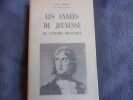


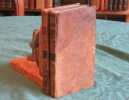
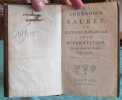
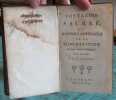
![1- HOBBES, [HOLBACH, traduction, édition]. De la Nature Humaine, ou Exposition des facultés, des actions & des passions de l'Ame, & de leurs causes ...](https://static.livre-rare-book.com/pictures/HAT/38500_1_thumb.jpg)
![1- HOBBES, [HOLBACH, traduction, édition]. De la Nature Humaine, ou Exposition des facultés, des actions & des passions de l'Ame, & de leurs causes ...](https://static.livre-rare-book.com/pictures/HAT/38500_2_thumb.jpg)
![1- HOBBES, [HOLBACH, traduction, édition]. De la Nature Humaine, ou Exposition des facultés, des actions & des passions de l'Ame, & de leurs causes ...](https://static.livre-rare-book.com/pictures/HAT/38500_3_thumb.jpg)


![1- [HOLBACH]. Système de la Nature ou Des loix du monde Physique & du monde moral. Par M. Mirabaud [i.e. d'Holbach]. Nouvelle édition à laquelle on a ...](https://static.livre-rare-book.com/pictures/HAT/38116_1_thumb.jpg)
![1- [HOLBACH]. Système de la Nature ou Des loix du monde Physique & du monde moral. Par M. Mirabaud [i.e. d'Holbach]. Nouvelle édition à laquelle on a ...](https://static.livre-rare-book.com/pictures/HAT/38116_2_thumb.jpg)
![1- [HOLBACH]. Système de la Nature ou Des loix du monde Physique & du monde moral. Par M. Mirabaud [i.e. d'Holbach]. Nouvelle édition à laquelle on a ...](https://static.livre-rare-book.com/pictures/HAT/38116_3_thumb.jpg)
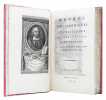




![Oeuvres complettes [sic] de M. Freret.. FRERET (Nicolas), [HOLBACH (Paul Thiry, baron d'), NAIGEON (Jacques André), LEVESQUE DE BURIGNY (Jean)]](https://static.livre-rare-book.com/pictures/HAT/38310_1_thumb.jpg)

